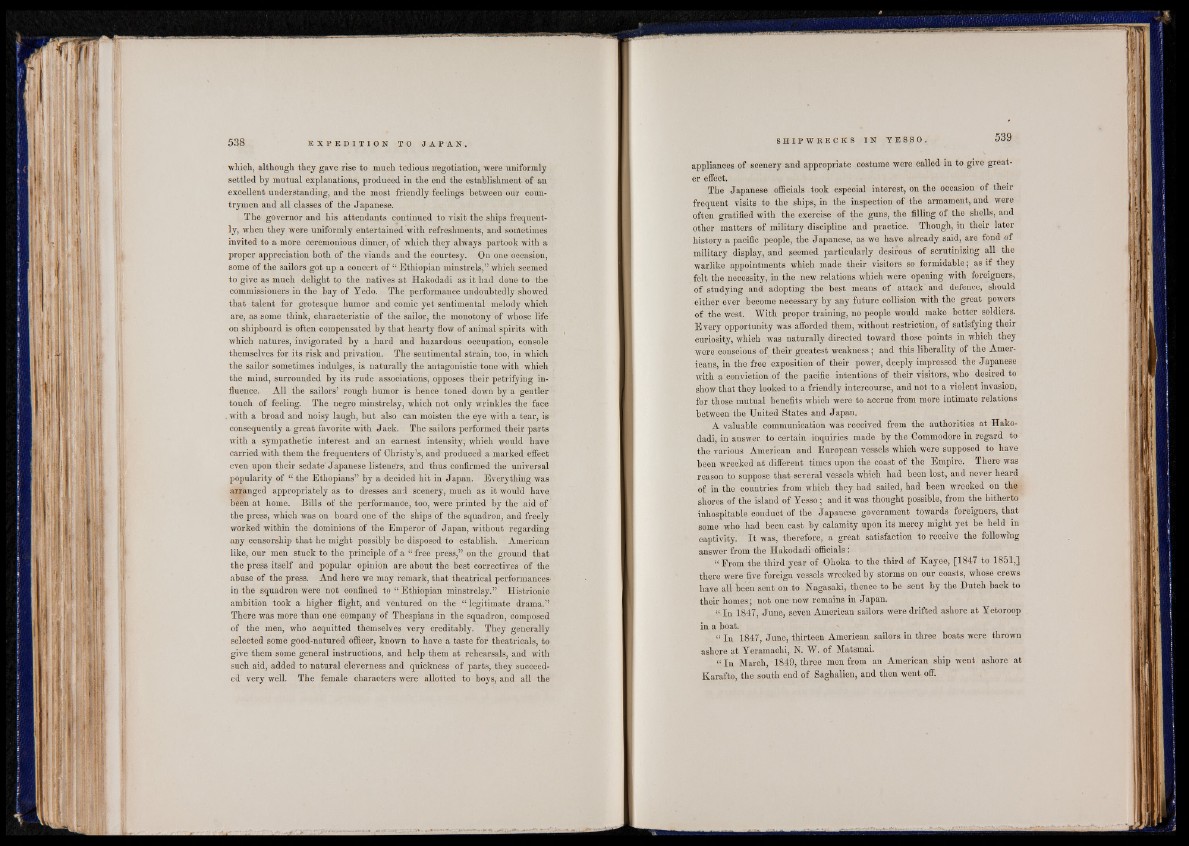
which, although they gave rise to much tedious negotiation, were uniformly
settled by mutual explanations, produced in the end the establishment of an
excellent understanding, and the most friendly feelings between our countrymen
and all classes of the Japanese.
The governor and his attendants continued to visit the ships frequently,
when they were uniformly entertained with refreshments, and sometimes
invited to a more ceremonious dinner, of which they always partook with a
proper appreciation both of the viands and the courtesy. On one occasion,
some of the sailors got up a concert of “ Ethiopian minstrels,” which seemed
to give as much delight to the natives at Hakodadi as it had done to the
commissioners in the bay of Yedo. The performance undoubtedly showed
that talent for grotesque humor and comic yet sentimental melody which
are, as some think, characteristic of the sailor, the monotony of whose life
on shipboard is often compensated by that hearty flow of animal spirits with
which natures, invigorated by a hard and hazardous occupation, console
themselves for its risk and privation. The sentimental strain, too, in which
the sailor sometimes indulges, is naturally the antagonistic tone with which
the mind, surrounded by its rude associations, opposes their petrifying influence.
All the sailors’ rough humor is hence toned down by a gentler
touch of feeling. The negro minstrelsy, which not only wrinkles the face
, with a broad and noisy laugh, but also can moisten the eye with a tear, is
consequently a great favorite with Jack. The sailors performed their parts
with a sympathetic interest and an earnest intensity, which would have
carried with them the frequenters of Christy’s, and produced a marked eifect
even upon their sedate' Japanese listeners, and thus confirmed the universal
popularity of “ the Ethopians” by a decided hit in Japan. Everything was
arranged appropriately as to dresses and scenery, much as it would have
been at home. Bills of the performance, too, were printed by the aid of
the press, which was on board one of the ships of the squadron, and freely
worked within the dominions of the Emperor of Japan, without regarding
any censorship that he might possibly be disposed to establish. American
like, our men stuck to the principle of a “ free press,” on the ground that
the press itself and popular opinion are about the best correctives of the
abuse of the press. And here we may remark, that theatrical performances-
in the squadron were not confined to “ Ethiopian minstrelsy.” Histrionic
ambition took a higher flight, and ventured on the “ legitimate drama.”
There was more than one company of Thespians in the squadron, composed
of the men, who acquitted themselves very creditably. They generally
selected some good-natured officer, known to have a taste for theatricals, to
give them some general instructions, and help them at rehearsals, and with
such aid, added to natural cleverness and quickness of parts, they succeeded
very well. The female characters were allotted to boys, and all the
appliances of scenery and appropriate costume were called in to give greater
effect.
The Japanese officials took especial interest, on the occasion of their
frequent visits to the ships, in the inspection of the armament, and were
often gratified with the exercise of the guns, the filling of the shells, and
other matters of military discipline and practice. Though, in their later
history a pacific people, the Japanese, as we have already said, are fond of
military display, and seemed particularly desirous of scrutinizing all the
warlike appointments which made their visitors so formidable; as if they
felt the necessity, in the new relations which were opening with foreigners,
of studying and adopting the best means of attack and defence, should
either ever become necessary by any future collision with the great powers
of the west. With proper training, no people would make better soldiers.
Every opportunity was afforded them, without restriction, of satisfying their
curiosity, which was naturally directed toward those points in which they
were conscious of their greatest weakness; and this liberality of the Americans,
in the free exposition of their power, deeply impressed the J apanese
with a'conviction of the pacific intentions of their visitors, who desired to
show that they looked to a friendly intercourse, and not to a violent invasion,
for those mutual benefits which were to accrue from more intimate relations
between the United States and Japan.
A valuable communication was received from the authorities at Hakodadi,
in answer to certain inquiries made by the Commodore in regard to
the various American and European vessels which were supposed to have
been wrecked at different times upon the coast of the Empire. There was
reason to suppose that several vessels which had been lost, and never heard
of in the countries from which they had sailed, had been wrecked on the
shores of the island of Yesso; and it was thought possible, from the hitherto
inhospitable conduct of the Japanese government towards foreigners, that
some who had been east by calamity upon its mercy might yet be held in
captivity. I t was, therefore, a great satisfaction to receive the following
answer from the Hakodadi officials :
“ From the third year of Ohoka to the third of Kayee, [1847 to 1851,]
there were five foreign vessels wrecked by storms on our coasts, whose crews
have all been sent on to Nagasaki, thence to be sent by the Dutch back to
their homes; not one now remains in Japan.
“ In 1847, June, seven American sailors were drifted ashore at Yetoroop
in a boat.
“ In 1847, June, thirteen American sailors in three boats were thrown
ashore at Yeramachi, N. W. of Matsmai.
“ In March, 1849, three men from an American ship went ashore at
Karafto, the south end of Saghalien, and then went off.